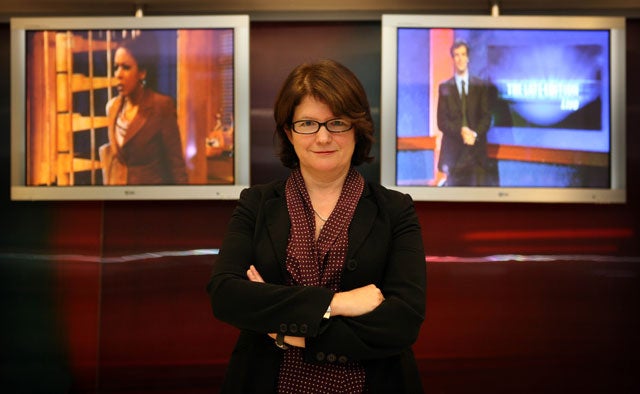BBC chiefs cash in after year of turmoil

Your support helps us to tell the story
From reproductive rights to climate change to Big Tech, The Independent is on the ground when the story is developing. Whether it's investigating the financials of Elon Musk's pro-Trump PAC or producing our latest documentary, 'The A Word', which shines a light on the American women fighting for reproductive rights, we know how important it is to parse out the facts from the messaging.
At such a critical moment in US history, we need reporters on the ground. Your donation allows us to keep sending journalists to speak to both sides of the story.
The Independent is trusted by Americans across the entire political spectrum. And unlike many other quality news outlets, we choose not to lock Americans out of our reporting and analysis with paywalls. We believe quality journalism should be available to everyone, paid for by those who can afford it.
Your support makes all the difference.Senior executives at the BBC have been given pay rises of more than £100,000 each after a year in which the corporation was dogged by phone-in scandals, job cuts, and revelations about editorial "fakery".
The director general, Mark Thompson, and nine other corporation bosses earned £4.96m in 2007-08, a rise of 17 per cent on the previous year. Most BBC employees received pay increases of 4 per cent over the same period, broadly in line with inflation. Mr Thompson's salary rose from £788,000 last year to £816,000, while that of Mark Byford, his deputy, rose from £437,000 to £513,000.
The corporation's annual report also revealed that for the fourth successive year Mr Thompson waived a bonus of £60,000, close to the maximum awarded by the corporation.
Jana Bennett, the director of BBC Vision, saw her salary rise by £103,000, to £536,000. She was criticised for her role in the "Crowngate" affair, after a trailer for a documentary wrongly suggested that the Queen had stormed out of a photoshoot at Buckingham Palace. An independent report into "Crowngate" criticised Ms Bennett for "showing a lack of curiosity" after being told of the blunder.
Her bonus was reduced by several thousand pounds to reflect the damage caused by the phone-in scandals involving Comic Relief, Children In Need and Saturday Kitchen. Mr Thompson said that Ms Bennett's bonus, which was reduced to £23,000, represented "a significant discount to reflect what had happened".
Jenny Abramsky, the outgoing director of audio and radio, who is leaving the BBC with a pension of £4m – thought to be a record for the British public sector – was paid £419,000, a 27 per cent increase from £329,000. Her bonus was £19,000.
Ashley Highfield, who has since left his post as future media executive director, saw his overall pay rise by £107,000 to £466,000. This came after the corporation went £36m over budget on its website.
The director general said "it didn't feel right" to take his bonus because of the "scale of disruption and uncertainty" across the BBC – a reference to widespread job cuts. In October, Mr Thompson announced that the BBC would lose up to 1,800 jobs, after receiving a smaller than expected licence fee settlement from the Government. That figure has since risen to 2,500.
He defended the salary hikes as necessary if the BBC was to remain competitive with commercial broadcasters, claiming the represented a "tiny fraction" of what executives earned at Channel 4 or ITV.
In November 2006, Michael Grade defected to ITV for a salary thought to be five times bigger than he was earning as BBC chairman.
"BBC executive benefits are set at a much lower level than most of our equivalents," Mr Thompson said yesterday. "When you actually get out into external world, some potential candidates almost roll on the floor laughing when you talk about potential levels of pay."
Mr Thompson added that feedback from the public suggested that trust in the BBC had fully recovered since the phone-in scandals.
Last year the BBC temporarily suspended all its phone-ins after faked contests were exposed. The corporation was separately fined £50,000 for a faked competition winner on Blue Peter, which forced the show's presenter, Konnie Huq, to issue an embarrassing apology live on air. Executives were also punished after the results of a poll to determine the name of the show's cat were changed by producers.
Mr Thompson described the past 12 months as, "a year when we encountered some problems but also a year of considerable achievement".
Troubled times for bosses
Jana Bennett Director, BBC Vision
Salary – £536,000 (up from £433,000)
Responsible for programmes that were engulfed by phone-in scandals. These included Children in Need, Sport Relief, and Blue Peter. Criticised for "lack of curiosity" over "Crowngate" affair.
Ashley Highfield Executive Director, Future Media
£466,000 (£359,000)
Overspent budget for bbc.co.uk by £36m, but tripled the number of British adults who use thewebsite. Has taken credit for the introduction of BBCi interactive TV and the iPlayer internet viewer.
Jenny Abramsky Director, BBC Audio
£419,000 (£329,000)
The Liz Kershaw Show, The Russell Brand Show, and The Jo Whiley Show breached standards on competitions. Ric Blaxhill, head of BBC Radio 6, was forced to resign after two shows featured fictitious competition winners.
Join our commenting forum
Join thought-provoking conversations, follow other Independent readers and see their replies
Comments